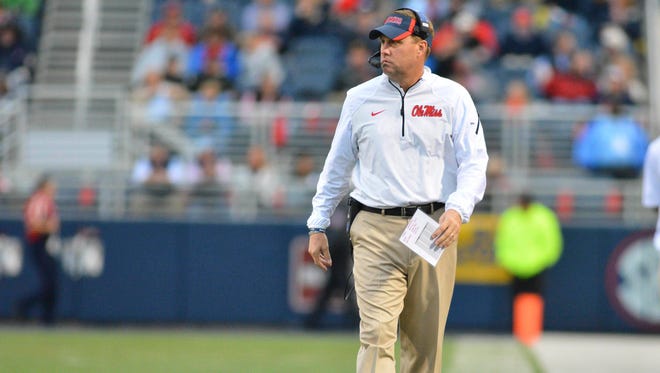Hugh Freeze's exit unlikely to benefit Ole Miss in NCAA case
 George Schroeder
George Schroeder
The fall was shockingly sudden. But we won’t know the full fallout for a while longer.
One moment Hugh Freeze was Ole Miss’ coach, and the school was all in with him, never mind the pesky NCAA — and the next he was gone, and the school was backing up the bus to roll over him again and again. But school officials took pains in a hastily arranged news conference Thursday night to note that Freeze’s forced exit was completely unconnected to the ongoing investigation into the football program, and did not change their chosen defense strategy.
“Our position on the facts documented in our response (to the NCAA) remains the same,” Ole Miss chancellor Jeff Vitter said.
Which means at least in terms of public posture and on the NCAA issues, Ole Miss will continue to defend Freeze. It puts the school in an awkward position for several reasons, starting with this: Much of the school’s defense against the 21 allegations was predicated on the good character of the guy they forced out Thursday for a “pattern” of personal misconduct.
MORE ON HUGH FREEZE:
Ole Miss football coach Hugh Freeze made call to number tied to escort service
Hugh Freeze brought down by hubris, vengeance and sex
Who is interim Ole Miss football coach Matt Luke?
Kellenberger: Hugh Freeze's downfall is also Ole Miss', and everyone shares in the fallout
Firing a head coach before the NCAA hands down penalties is a time-honored way to show a school is taking matters seriously, with an eye toward mitigating possible penalties. But that’s not what happened here. Again, here’s the chancellor:
“It’s important to note,” Vitter said, “that this matter is not related to our NCAA case.”
And that makes the impact of Freeze’s departure on Ole Miss’ NCAA fate difficult to decode. But it could very well make things worse.
Before the news broke of Freeze’s call to an escort service and the subsequent revelation that Ole Miss had found a pattern of apparently similar occurrences, the decision to defend and protect Freeze was understandable on a couple of levels, including mainly that he beat Alabama twice and took Ole Miss to two New Year’s Six bowls. The Rebels were relevant.
Given all the success, the idea was to keep the coach and fight the NCAA and then, after whatever penalties were handed down, to move on with him. The school had already self-imposed a bowl ban for 2017, in hopes it would be enough. Outside the Oxford bubble, though, it seemed likely NCAA was going to hammer Freeze and Ole Miss.
Under the organization’s rules regarding a head coach’s responsibility, Freeze faced a potentially lengthy suspension. If that became reality, or if the school were to catch wind other significant penalties might be in the offing, it was easy to see how the apparently staunch support for Freeze might suddenly evaporate.
(Even though he is no longer employed, Freeze still faces the suspension, and perhaps even a show-cause order. Either or both presumably would affect his employment opportunities at other schools.)
But what happens now that he’s gone for reasons “not related to our NCAA case,” as Vitter put it? Will the NCAA’s committee on infractions regard his departure as the “pound of flesh” that sometimes leads to lighter sentences? That seems iffy.
When it comes to NCAA penalties, making predictions is always a fool’s game. But even with Freeze out of the picture, the school remains tied to him. And now, the case essentially is: Even while we were completely unaware of these personal issues, at the same time we believe he acted with integrity in running the football program.
If anything, there might be a fresh question in the minds of members of the committee on infractions: Why did it take an outside attorney (Houston Nutt’s lawyer) and a lawsuit to uncover Freeze’s phone calls? What else might the school have missed when investigating the NCAA issues?
Among the most serious of the charges Ole Miss faces is that of lack of institutional control. Even this week at a speaking engagement, Ole Miss athletic director Ross Bjork spoke glowingly of the “culture” Freeze had established. Does this sudden personal scandal do anything at all to reduce the idea that school officials were blind to significant issues in and around the football program? Were they that naïve? Or could they have been willfully blind?
Technically, none of that enters into the NCAA’s case. But it’s all part of the background in which the school’s fate will be decided.
Freeze’s ouster probably does not help Ole Miss. Could the reasons he’s gone actually hurt? We won’t know for a few months.
